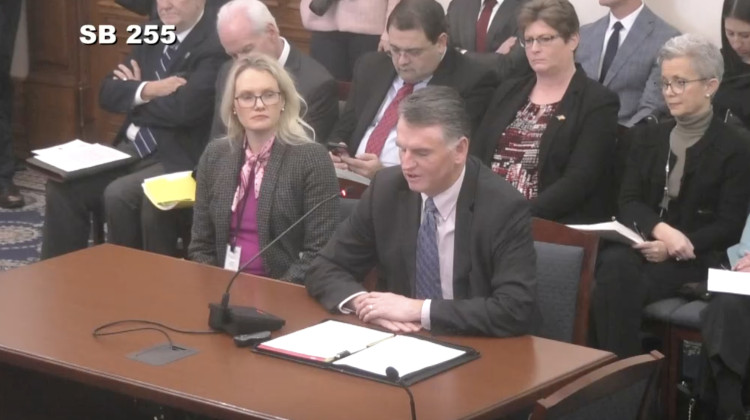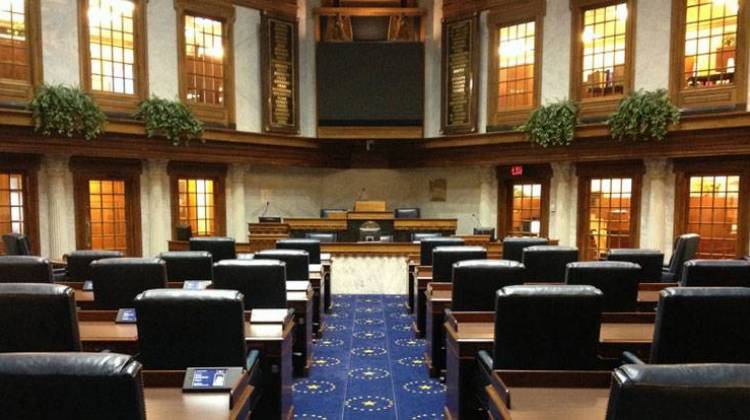
State Treasurer Dan Elliott spoke in support of SB 255 at the Senate Appropriations Committee on Thursday.
Screenshot of Indiana General Assembly livestreamA Republican lawmaker introduced legislation that would reshape Indiana’s school choice system. However, the plan likely won’t face a vote until next year.
Senate Bill 255 would consolidate Indiana’s popular private school voucher system and other options that provided families with state funds for their students’ educational needs into a single program, the Indiana Funding Students First (FSF) Grant Program.
It would have no income restrictions and be open to any K-12 students in the state between the ages of five and 22.
The bill’s author, Republican Sen. Ryan Mishler (R-Mishawaka), said the bill would give parents more control over their children’s education.
“We’re trying to give parents more options,” he said. “We keep putting more money into K-12 education but then we keep hearing our kids are doing worse in testing and reading, and so something’s not working.”
The bill would effectively replace the Education Scholarship Account Program, the Choice Scholarship Program, and the Career Scholarship Account program with the new FSF program. The new program would be managed by the Indiana treasurer of state’s office. The treasurer currently oversees the state’s Education Scholarship Account Program.
State Treasurer Daniel Elliott said he is in favor of the bill because it gives parents and students more choices.
“Every child is unique, and every child has different needs. Those needs change at different ages and in different circumstances,” he said. “Parents need the option to customize their child’s education based on their child’s current needs.”
The bill says the program would pay for private school tuition, special education services, tutoring, fees for assessments and exams, career training, extracurricular activities, apprenticeships, certain transportation costs and more. It does stipulate that funding cannot be used to pay parents for teaching their own children.
“Imagine a situation where a child could take a chemistry class at a public school, a math class at a private school, an English class with a private teacher, and a music class from a professional musician. Or imagine a parent that can send one child to a private school, one child to a charter school, and one child to an apprenticeship program,” Elliott said. “I realize these concepts frighten some traditionalists, but we’ve found that when you trust parents, they make the right decisions for their children.”
READ MORE: How do I follow Indiana’s legislative session? Here’s your guide to demystify the process
Join the conversation and sign up for the Indiana Two-Way. Text "Indiana" to 765-275-1120. Your comments and questions in response to our weekly text help us find the answers you need on statewide issues, including our project Civically, Indiana and our 2024 legislative bill tracker.
The funding would be distributed into individual students’ accounts by the treasurer’s office before being distributed to state-approved vendors.
The bill says eligible students enrolled in a public school corporation could receive up to $3,340.50, or half the amount of per-student funding given to public schools in Indiana. However, students cannot spend the grant money for services provided by their school corporation.
Students not enrolled in a public school could receive up to 90 percent of the $6,681 in per-student funding provided to public schools. Students enrolled in virtual schools could receive funding for 85 percent of the cost of the virtual services.
“This bill is not a silver bullet that will fix our education system,” Elliott said. “This bill is not a program that would take away from our existing public or private school systems. This bill is not an attempt to restrict, harm, or limit our homeschool families and how they choose to educate their children.”
The state’s Legislative Services Agency estimated that the new FSF program could cost the state about $46.5 million due to administrative and other costs. The report assumes that the number of students who would enroll in the program would be similar to the number of students currently enrolled in the voucher, career scholarship account and education scholarship account programs. However, the LSA said there are many variables that could change the fiscal impact of the bill.
Mishler said the bill will not be up for vote this session. Instead, lawmakers will work on it over the summer and reintroduce it in the 2025 legislative session.
“We’ll be working over the summer to try to perfect things,” he said. “We have plenty of time for discussion.”
Kirsten is our education reporter. Contact her at kadair@wfyi.org or follow her on Twitter at @kirsten_adair.
9(MDAyMzk1MzA4MDE2MjY3OTY1MjM5ZDJjYQ000))
 DONATE
DONATE






 Support WFYI. We can't do it without you.
Support WFYI. We can't do it without you.